Rising to the Occasion
Exclusive HomePage News Report on the 2022 IHA Occasions Survey offering an in-depth look into how consumers are currently celebrating life moments and what that means for home + housewares purchasing in 2022.
How consumers celebrate special occasions has changed, especially over the past two years amid the pandemic, but the desire and need to celebrate has not.
Life events that are celebrated have shifted drastically due to the pandemic. The birthrate dropped and weddings were postponed, as were college send-offs. With consumers working and schooling from home more often, the pandemic saw an uptick in new pet owners and new homes, many sought out more space and freedom for a new remote work life by buying new homes. And there was an uptick in new pet owners.
With these changes comes a shift in consumer gifting needs and wants — something the home + housewares industry is deeply invested in and must keep a close eye on to adapt product development, marketing strategies and business plans.
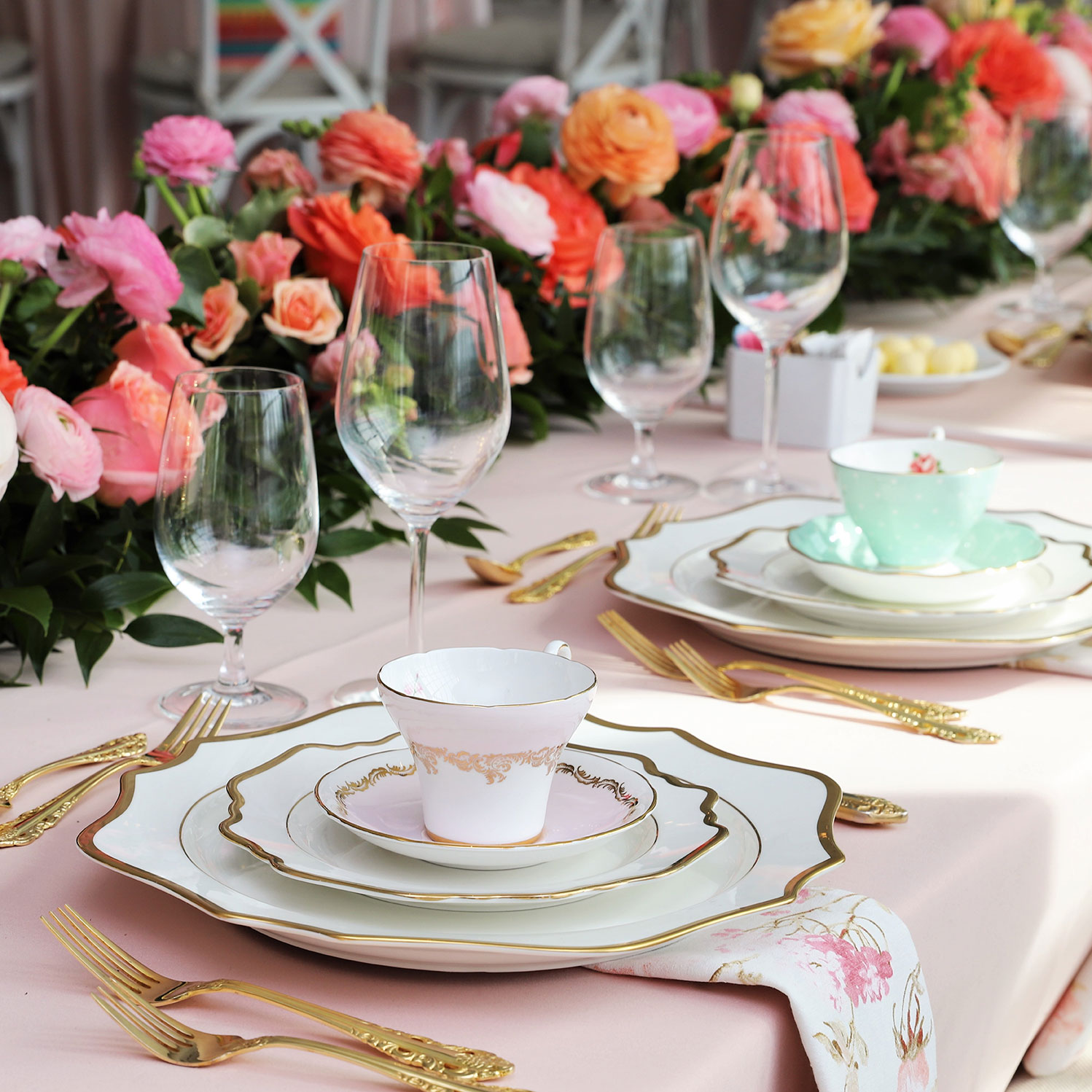
In the face of these new cultural shifts, the International Housewares Association recently commissioned a study by consumer research firm Morning Consult to tap into what life moment occasions consumers plan to celebrate how in the coming year and how that will impact the home and housewares business. Results are based on a survey of more than 2,200 adults nationwide, measuring their expectations on life events in 2022 for themselves, as well as for friends and family. For each event type, the Survey identified tendencies and preferences related to home and housewares product purchases.
This special report showcases expert analysis and further insight into consumer gift preferences and shopping behaviors based on each of the eight key life events expected to shape special occasions in 2022: Engagements; Bridal Showers; Weddings; New Home Ownership; New Pet Ownership; Baby Showers; Off to College; and Retirement.
“In 2020 births were down nearly 300,000 from past years, weddings and engagements were put on hold and new pet ownership went up dramatically,” said Leana Salamah, vice president, marketing, International Housewares Association. “Things changed in life during the pandemic. With this report, our goal is to benchmark and understand how consumers will behave going forward.”
“In 2020 births were down nearly 300,000 from past years, weddings and engagements were put on hold and new pet ownership went up dramatically … Things that have changed in life during the pandemic. With this report, our goal is to benchmark and understand how consumers will be going forward.”
— Leana Salamah, VP Marketing, International Housewares Association

60% of overall respondents will either own a new pet or a new home in the coming months!
Generally, respondents are mixed on whether and how often they, friends and family will experience celebratory occasions in 2022. Overall, respondents selected new pet ownership (32%) and new home ownership (32%) as the life events most likely to take place in their own lives in the coming months. The largest share of adults (60%) stated it was not likely friends or family would be leaving for college in the next year, all of which reflects the current consumer pandemic behaviors.
In addition, not surprisingly, respondents aged 18-34 said they and/or their friends would experience all these key life events, except retirement, in the coming year. As for responses from men versus women, there was a slight uptick among men who expect friends to leave for college (20%) and retire (25%) in the coming year.
In one notable demographic indicator, respondents in the Northeast were the most likely to purchase gifts for bridal showers, baby showers, and new home/housewarming purchases.
“This suggests the nine states in that region of the country may have a disproportionate sense of confidence in gathering in large groups once again,” IHA’s Salamah noted. “This happens to correlate with vaccination status, as these states were all within the top 15 in terms of rate of vaccination at the time the study was fielded, so it is likely that this plays a role in their pronounced confidence.”
As for gift giving, 57% of adults surveyed stated they are the primary decision-maker for purchasing decisions, with 19% responding they equally share the responsibility. Cash and gift cards top the list across the board. However, many home and housewares goods are top of mind as well, particularly to celebrate events such as a new home, leaving for college and weddings, with most of the expected buying activity taking place in July to September.
Of the most popular home and housewares products mentioned, adults are most likely to say they would purchase a kitchen product for a wedding (51%) or housewarming (56%); bathroom/personal care products for a baby shower (42%); cleaning/home environment products for new pet ownership (51%); and bedroom products for someone leaving for college (53%).
Baby Showers
After a pause in births during the height of the pandemic, many women are ready once again, to have a child. In fact, according to the 2022 IHA Occasions Survey, 25% of respondents indicated that it is likely they would attend a baby shower for a friend or family member in the coming year.
When asked about having their own baby shower, 28% of adults aged 18-34 and 22% of adults aged 35-44 responded it is likely in the next year. These responses not only indicate couples are ready to have babies once again, but they also reflect the current shift in the average age of new mothers, as they are older than in previous years.
According to a recent Forbes article, the average age of first-time moms is up from 21 to 26 years of age, with more women, including older millennials, putting off having babies until the early-to-mid 30s. Why? Several reasons, such as career goals, financial considerations and access to health care. This shift points to a more mature mom-to-be who has deeper roots in her lifestyle and needs.
“Perhaps the mom-to-be is keen on making her own baby food. A food processor and set of silicone ice cube trays to store the food would be a good fit. By looking at her cooking and lifestyle habits, we can dig into gift ideas that she will really want and use.”
– Marsha Everton, Principal, Corporate Director and Advisor, The AIMsights Group
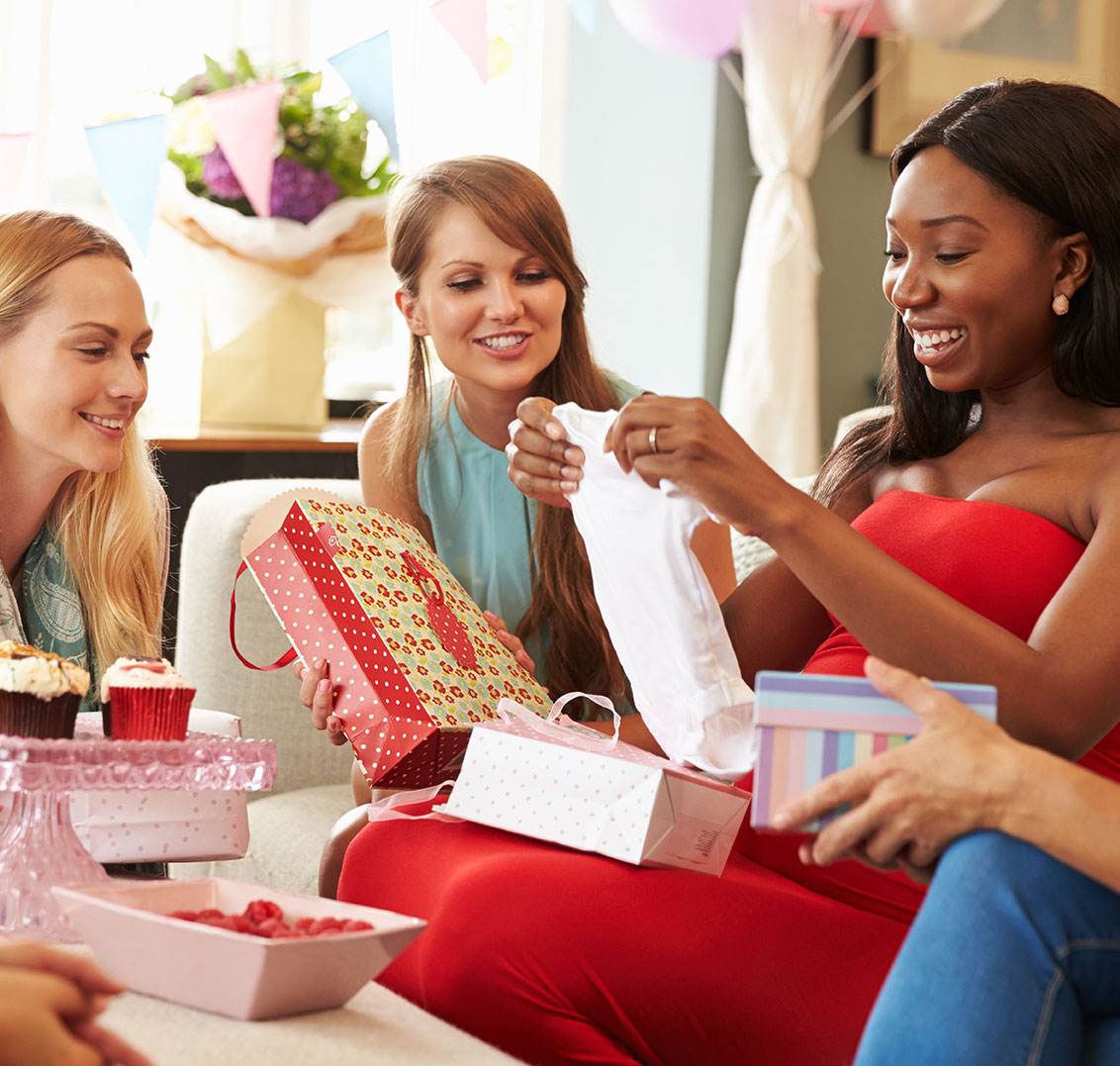
When asked about having their own baby shower, 28% of adults aged 18-34 and 22% of adults aged 35-44 responded it is likely in the next year, reflecting the ongoing increase in acceptable perceived age of individuals planning for a new child.
“This shift gives the industry an opportunity to market something new and fresh to the gift giver and the recipient, something that speaks more closely to her lifestyle,” said Marsha Everton, principal, corporate director and advisor, The AIMsights Group, a market research organization. “Perhaps the mom-to-be is keen on making her own baby food. A food processor and set of silicone ice cube trays to store the food would be a good fit. By looking at her cooking and lifestyle habits, we can dig into gift ideas that she will really want and use.”
Another point to consider is that regardless of their age, most new moms today will likely return to work (virtual, live or a combination thereof), and daycare needs come into play. Gifting food storage goods for baby’s needs and other on-the-go accessories can be of high interest and use to new moms.
And while only 15% of Survey respondents stated that a kitchen appliance was the first thing to come to mind for a baby shower gift, marketers are in a good position to align their messaging with the modern needs of parents, honing in on the realities of today’s lifestyles.
Most new moms today will likely return to work (virtual, live or a combination thereof), and daycare needs come into play. Gifting food storage goods for baby’s needs and other on-the-go accessories can be of high interest and use to new moms.
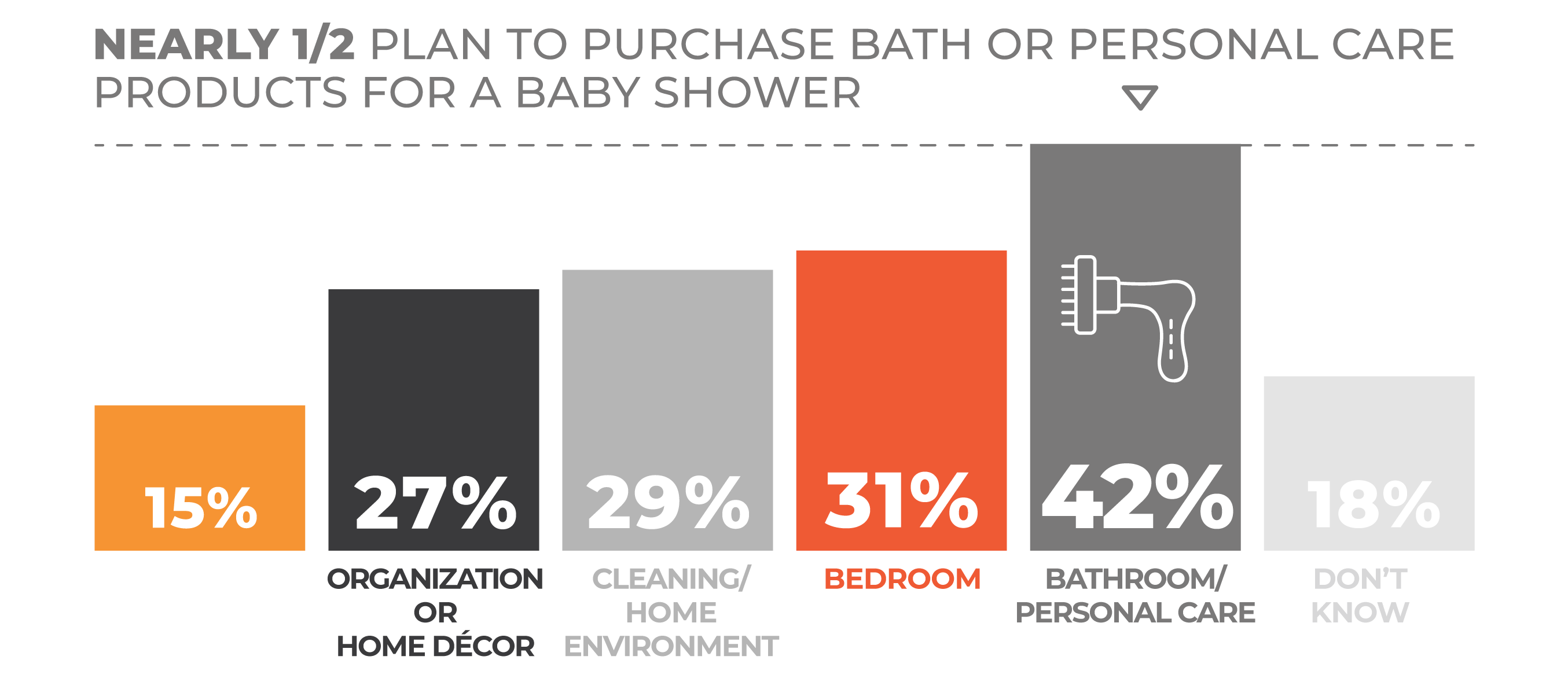
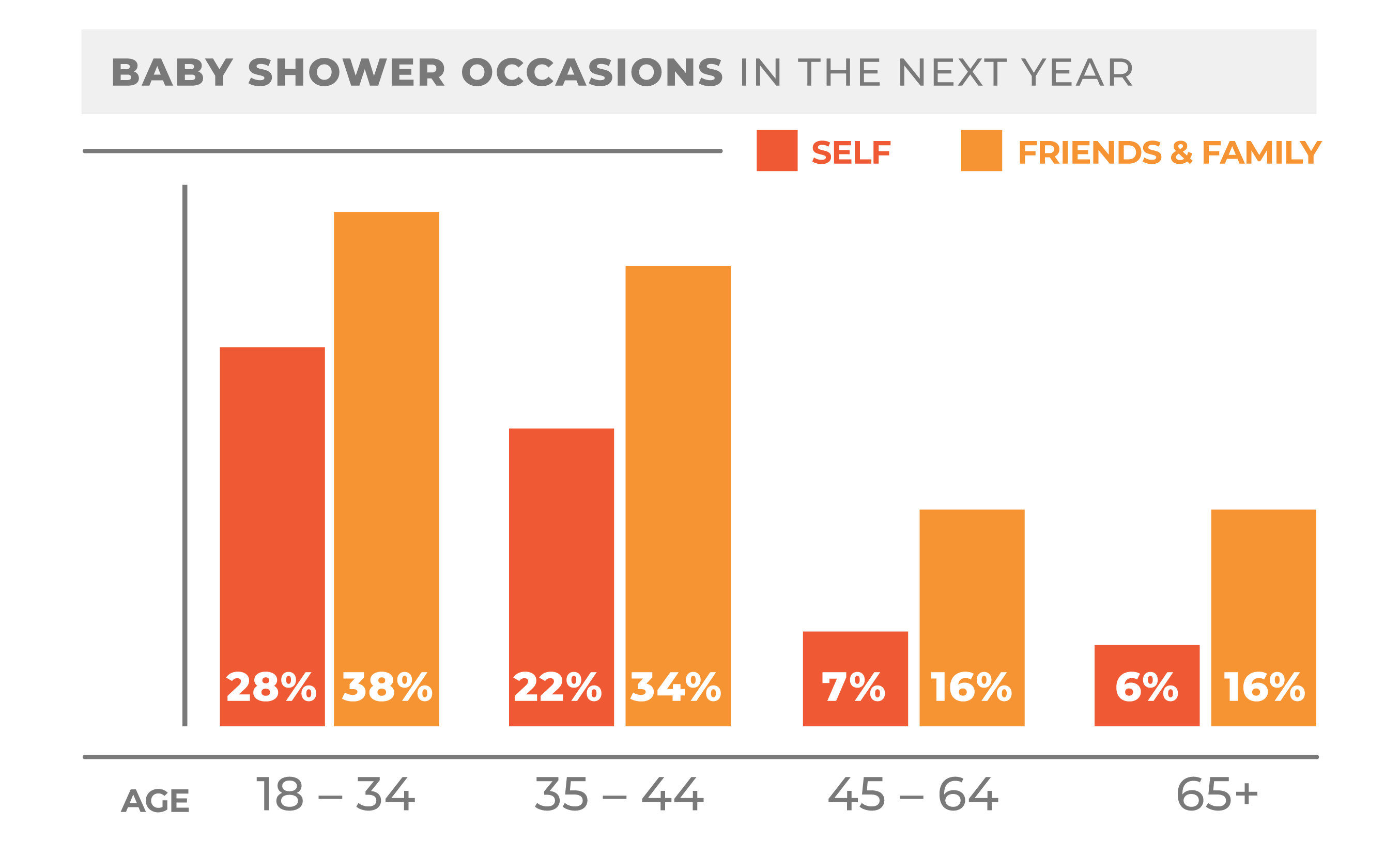
Bridal Showers
Whether in-person or virtually, celebrating upcoming forthcoming weddings is back and more personal than ever. With today’s brides and grooms averaging a little older, they are also more in tune with their lifestyle choices, wants, needs and desires.
And while the shower is meant to celebrate a couple’s decision to marry, it is also the opportunity to focus on engaged couples with personal gifting as a major objective, whether shopping for gifts on or off a wedding registry.
With that, bridal showers offer a major opportunity for retailers to communicate their personalization programs with consumers. Personalized glassware, cutting boards, serveware, photo frames and more all have a place at the gifting table for a shower, so too do the accessories that support a couple’s lifestyle.
“If they are over 30, they most likely don’t want the same things as the traditional 25-year-old, who maybe hasn’t lived out on their own and has not established a home yet. … Gifts needs to speak to the bride who may already have a more established taste.”
– Leana Salamah, VP, Marketing, IHA
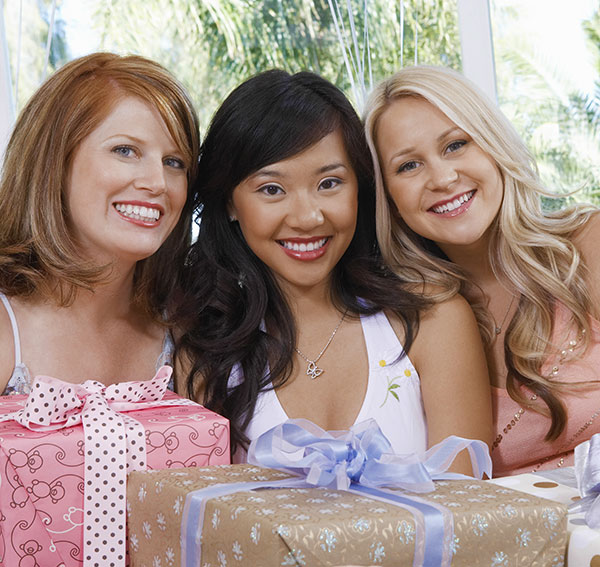
Industry insiders suggest looking at mature shopping and lifestyle habits of what could be a more mature and home-established couple to find the right message.
Do they cook? That coveted enamel Dutch oven, roasting pan or even high-powered blender might be just the right fit. Do they tend bar at home? Monogrammed wine glasses, a premium wine opener or a bar cart itself, might be what they’re looking for. The key for retailers is to communicate their knowledge of these wants and needs and how such products fit.
It’s also important to know the complete demographic picture of the bridal shower gift opportunity. For example, according to the 2022 IHA Occasions Survey, respondents in the Northeast region of the country are far more apt to celebrate events such as a bridal shower and stated that a bridal shower and spend more on a gift than those in other parts of the country.
Some 29% of Northeast adults stated that a bridal shower was likely to take place among their friends and family in the coming year, versus a lower percentage in all other regions of the country: 18% in the Midwest; 21% in the South; and 21% in the West.
This suggests that the Northeast region would fare well with messaging that drives home the bridal shower gift messaging with goods that may also have a higher price tag.
As for what type of home + housewares consumers are most prone to shop for when it comes to a bridal shower, nearly half of Survey respondents selected kitchen products as their top choice (44%), with bedroom (35%) and bathroom/personal care (34%), rounding out the top three.
Consumers have been re-evaluating their career choices during the pandemic, and many are choosing instead to head back to college. And whether they plan to live on or near campus, or are transitioning a space at home for studies—all categories are up for consideration when it comes to purchasing for a new college student, no matter the age.
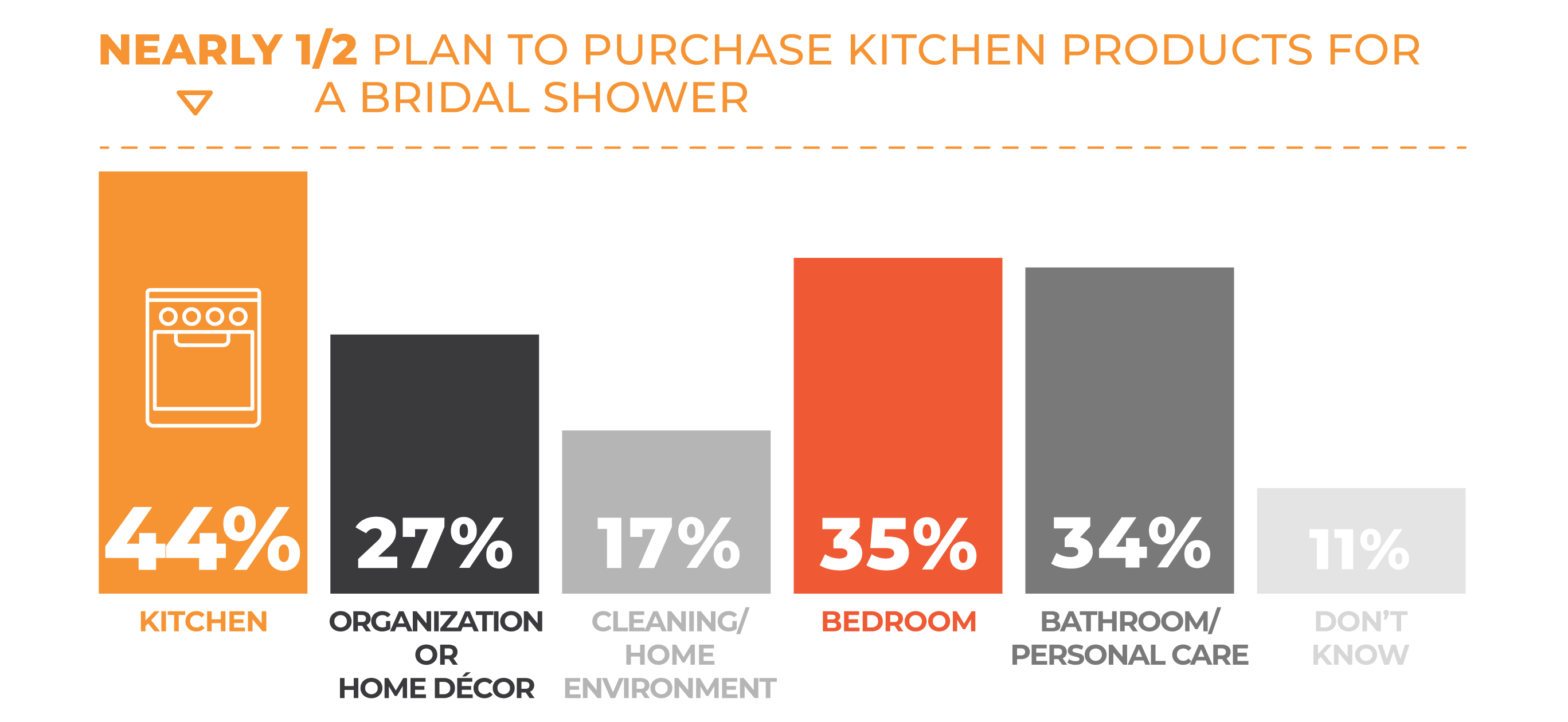
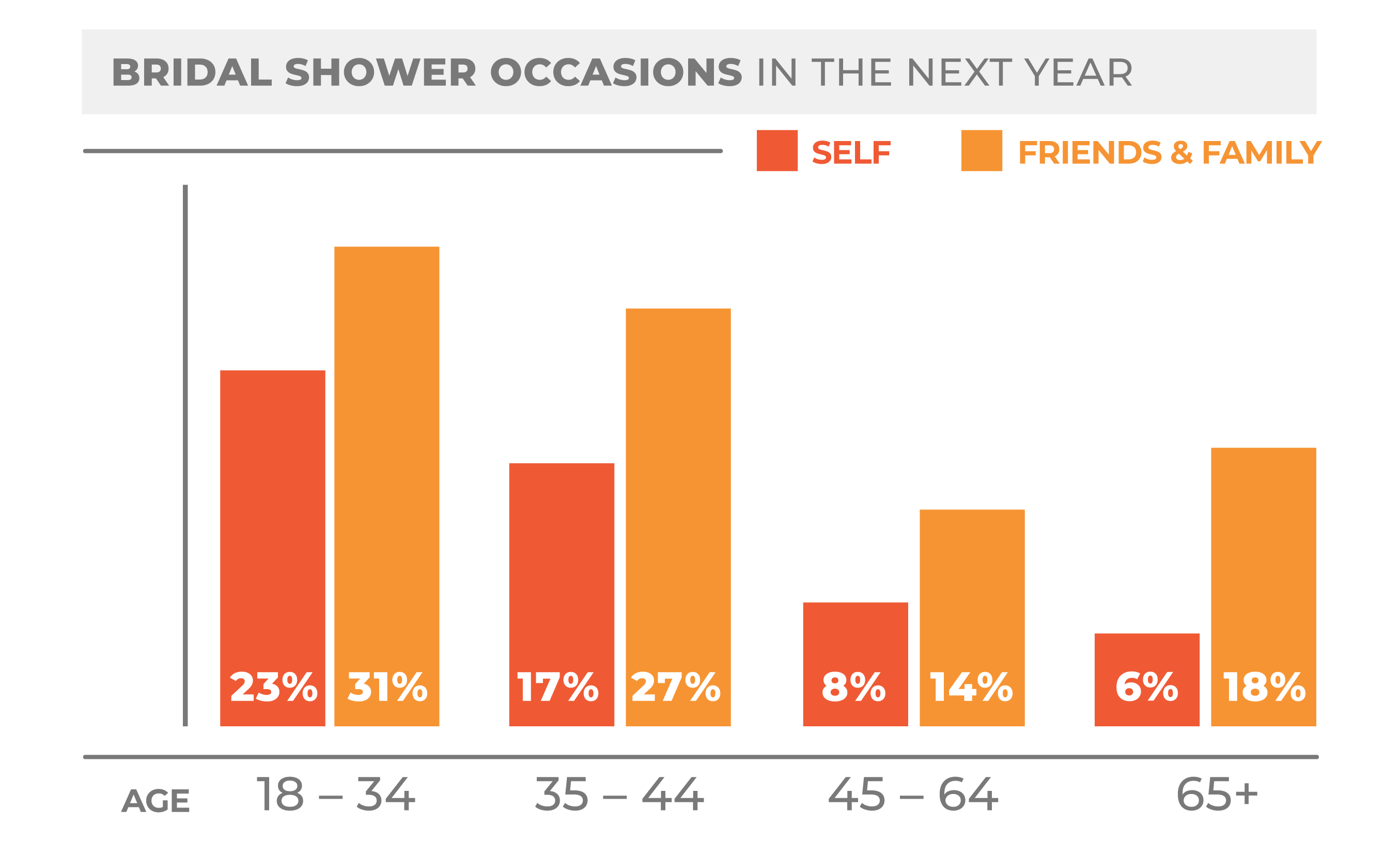
Off to College
As more young consumers put off college during the pandemic — in part because costs and health concerns, older consumers in the throes of a career pivot are returning to campus.
It’s no question the cost of college has risen exponentially. According to Citizens’ Annual Student Lending Survey, during the last decade, college costs have increased by approximately 25% and U.S. student debt has increased by more than 100%. As such, several high school graduates are putting their college plans on hold, the Survey revealed, with 70% of respondents stating that affordability derailed their fall 2021 plans.
The 2022 IHA Occasions Survey mirrored this trend, as only 38% of respondents aged 18-23 and 12% of those aged 24-29 (typical college/graduate school ages) stated it was likely they would leave for college in 2022. One of the most interesting shifts was the increase in the number of older adults (28%) aged 30-34, that said they were likely to attend college in the next year.
“With people in their early 30s increasingly going back to school, this presents a huge marketing opportunity for the home + housewares industry to support their transition”
– Leana Salamah, Vice President, Marketing, IHA

“With people in their early 30s increasingly going back to school, this presents a huge marketing opportunity for the home + housewares industry to support their transition,” said Leana Salamah, vice president, marketing, International Housewares Association.
Consumers have been reevaluating their career choices during the pandemic and many are choosing instead to head back to college. And whether they plan to live on or near campus, or are transitioning a space at home for studies, storage and organization, bedding, ready-to- assemble furniture — even coffee makers — all are up for consideration when it comes to purchasing for a new college student, no matter the age.
According to the Survey, bedroom products, selected by 53% of respondents, is the most likely purchase for college-bound people, with organization or home décor products (41%) and bathroom or personal care products (39%) rounding out the top three responses.
The opportunity is wide open to market new housewares solutions to consumers in this age range, helping them embark on their academic careers. It is also a unique opportunity to speak to these consumers on a self-gifting level. As they are generally older than typical students, perhaps with savings to spend as they head back to college, they may want to outfit their space with products for the modern student. This could mean, for example, a new, versatile, space-saving ready-to-assemble desk with enhanced storage features.
This age group might also include young parents who are going back to school but still with need to take care of their families. Convenience-oriented goods such as slow cookers, multi-cookers and programmable coffee makers could become very attractive to such consumers.
Still yet, if they are returning to a dorm, perhaps for graduate school, the comforts of home will be missed. Products like air purifiers, portable fans and heaters, and non-electric coffee makers could be top of mind.
Consumers have been re-evaluating their career choices during the pandemic, and many are choosing instead to head back to college. And whether they plan to live on or near campus, or are transitioning a space at home for studies—all categories are up for consideration when it comes to purchasing for a new college student, no matter the age.
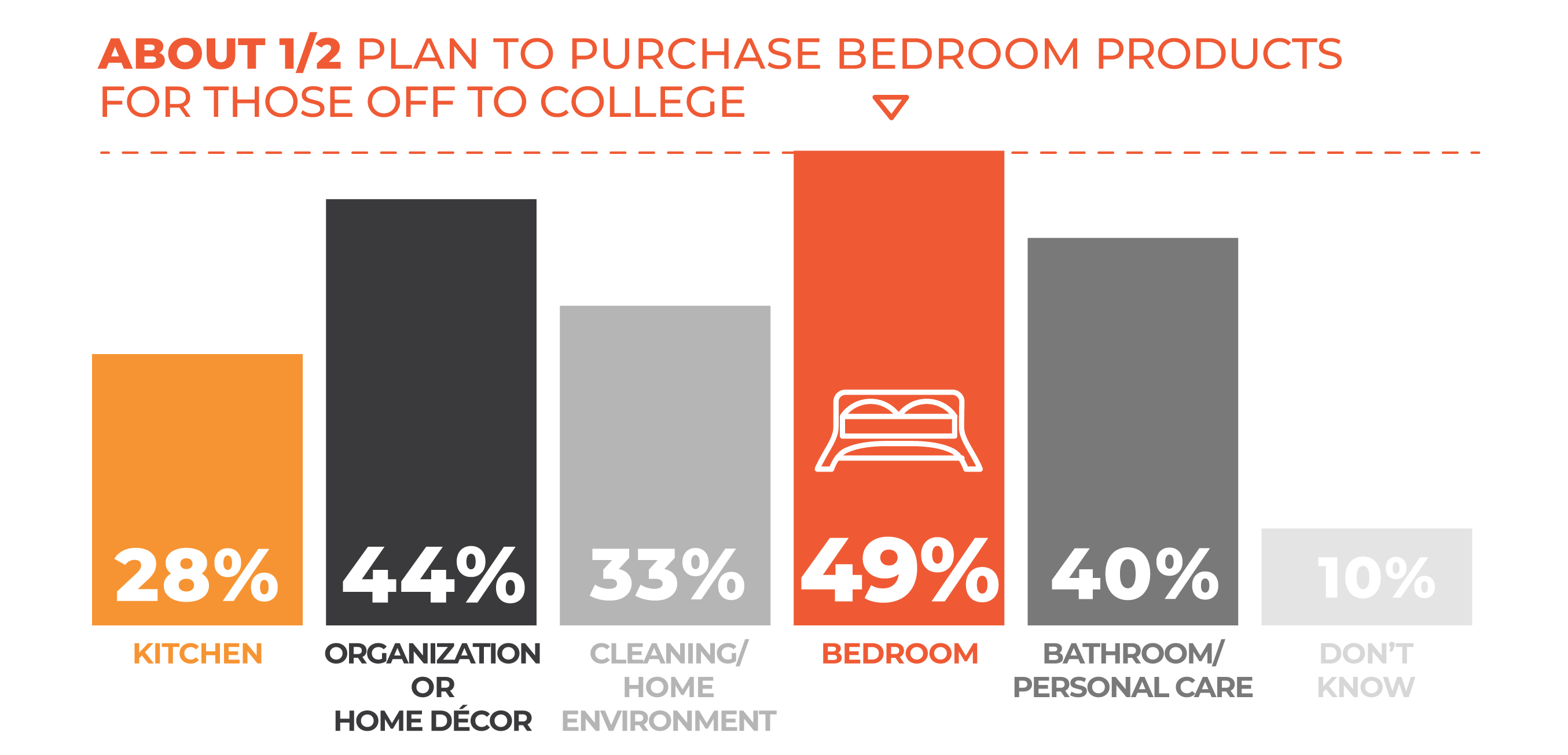
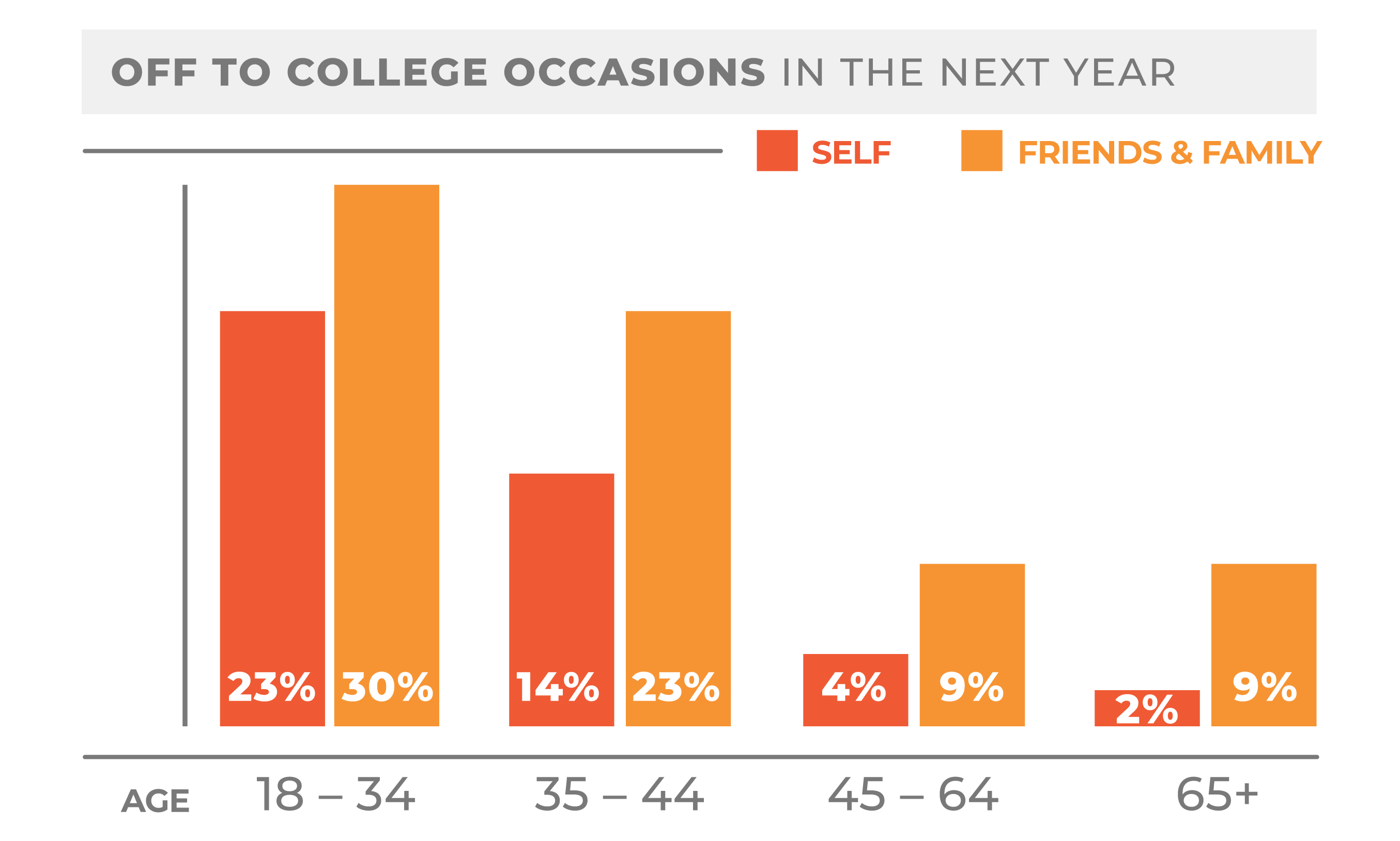
Engagement
Couples are getting engaged at a faster pace, not wanting to wait amid the pandemic any longer, as they are ready for the next chapter of their lives to begin.
With 40% of adults aged 18-34 and 30% of adults aged 35-44 responding to the 2022 IHA Occasions Survey that it is likely a friend/family member will get engaged in 2022, it seems that marriage is once again on the rise after taking a pause amid the height of the pandemic.
In fact, according to The Knot’s 2021 Jewelry and Engagement Study, in 2021, there were 5,000 engagements among people aged 18-54 in the U.S., engaged between January and November 2021. Couples are making the decision to tie the knot with a revived energy. With the majority having quarantined together and wanting to have their partner by their side to take on the next challenge, getting engaged has taken on a new meaning.
With that said, gifts for engaged couples have certainly evolved beyond the more traditional picture frames, ring holders and cash, which still leads the list of the most expected gift to give.
Instead, with couples waiting longer to marry and living together prior to marriage more often, today’s engaged couples are more established in their living arrangements and often prefer gifts that support the experiences they wish to recreate at home, such as cooking a dish from their favorite restaurant or recreating a cocktail from a new bar. However, a challenge for retailers is competing with the growing incidence of giving cash or gift cards to engaged couples, unsure of what they may want or need if they don’t yet have a registry in place, or they don’t quite know the couple well enough.
“We find comfort in our minimalism and prefer not to receive something that we don’t really need…a wish list provides the opportunity for new couples to receive something that their hearts desire—something that will make them happy and in turn, gives the gift giver joy for making that wish come true.” ”
– Marsha Everton,Principal & Corporate Director, The AIMsights Group

According to Marsha Everton, principal, corporate director and advisor, The AIMsights Group, a wish list is something that provides couples with an opportunity to let others know the types of goods that would fit into their new lives.
“We are in a world where we really are trying to cut down the acquisition of things that are not useful or appreciated,” Everton said. “We find comfort in our minimalism and prefer not to receive something that we don’t really need. Instead, a wish list provides the opportunity for new couples to receive something that their hearts desire — something that will make them happy and in turn, gives the gift giver joy for making that wish come true.”
Experiences are something that engaged couples often appreciate most as they start dating and building relationships. As relationships evolve into being more settled, recreating experiences at home becomes even more desirable. As such, goods within the home + housewares categories can play a central role in fulfilling such experiences. In the 2022 IHA Occasions Survey, 34% of respondents aged 18-34 stated they were most likely to purchase a housewares item as an engagement gift. Of the top categories, bedroom products (34%), kitchen products (33%), and bathroom/personal care products (33%) and organization/home décor products (33%) were the top selections.
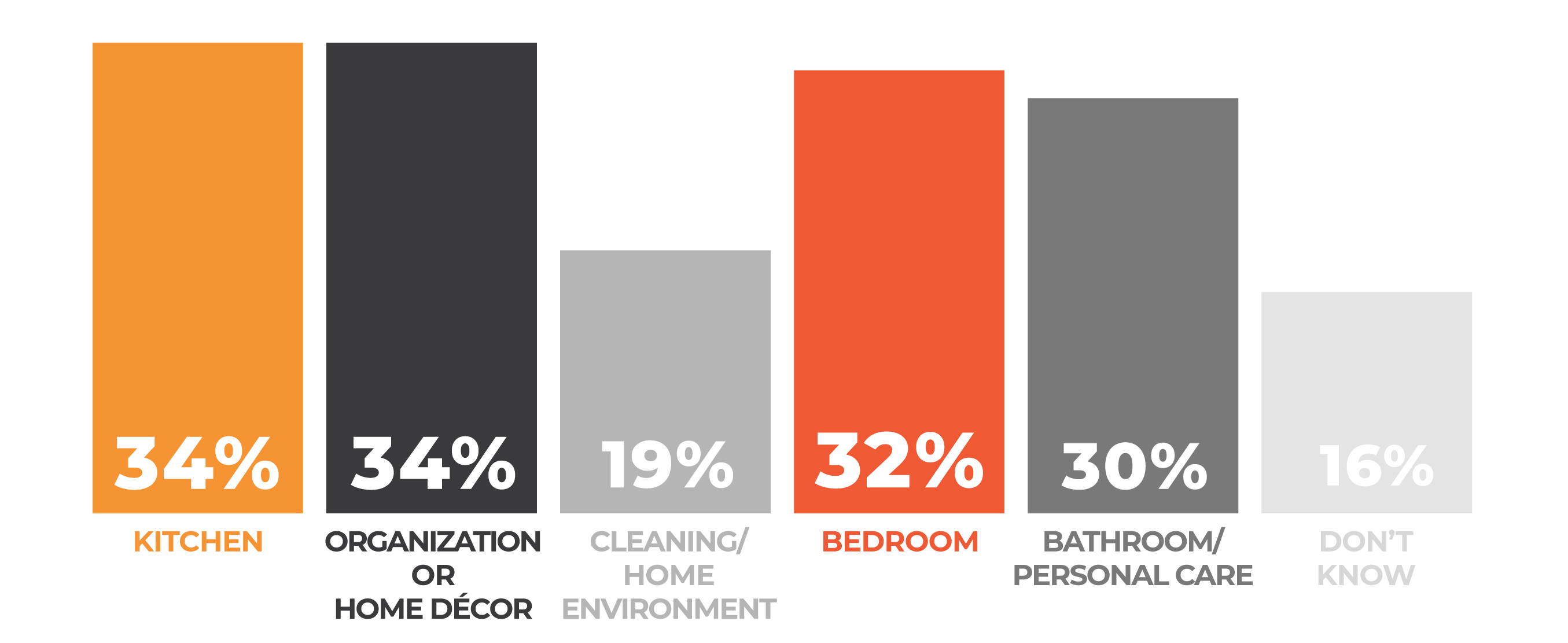
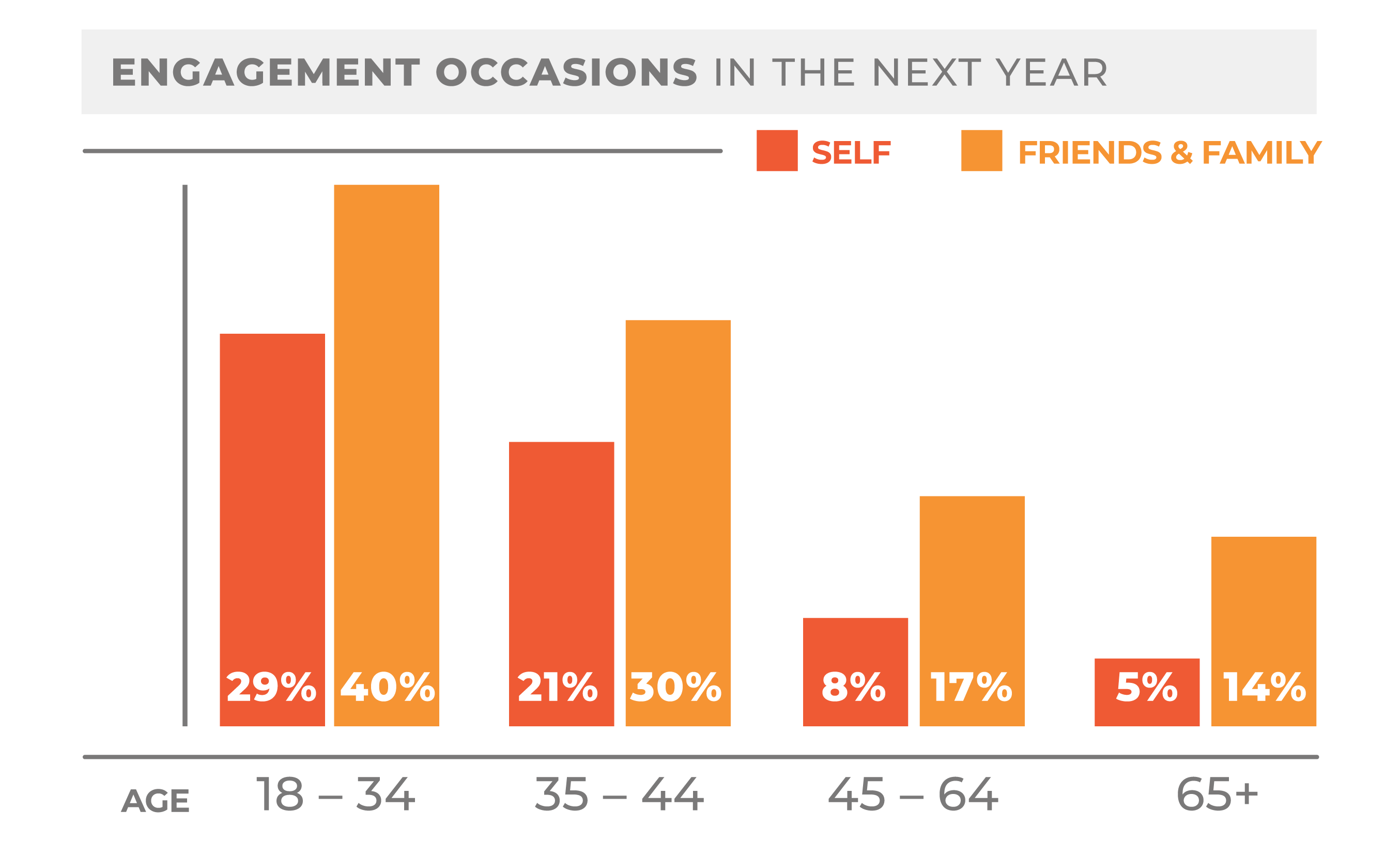
Weddings
Weddings, one of the most traditional celebratory milestones and registry events, are back after a near two-year pause due to the pandemic.
With many couples waiting out their wedding dreams until gathering restrictions were lifted, weddings were a popular event in 2021 and are predicted to be so, once again in 2022. There continues to be a backlog of bookings, as well as couples who waited until it was safe to celebrate as originally planned. Weddings, one of the most traditional celebratory milestones and registry events, weddings are back after a near two-year pause due to the pandemic.
With many couples waiting out their wedding dreams until gathering restrictions were lifted, weddings were a popular event in 2021 and are predicted to be so, once again in 2022. There continues to be a backlog of bookings, as well as couples who waited until it was safe to celebrate as originally planned.
As such, 28% of the 2022 IHA Occasions Survey respondents said a wedding will take place for their friends and family in the next year, with 30% of respondents stating it is likely they will purchase a home + housewares gift as a wedding present in the next 12 months.
“In 2020 births were down nearly 300,000 from past years, weddings and engagements were put on hold and new pet ownership went up dramatically. Things changed in life during the pandemic. With this report, our goal is to benchmark and understand how consumers will behave going forward.”
– Leana Salamah, VP, Marketing, IHA

Respondents in the Northeast were the most likely to purchase gifts for bridal showers, baby showers and new home/housewarming purchases.
This is a promising development especially as cash (39%) and gift cards (14%) remain top of mind as the gift of choice for such an event.
For those who did plan to purchase a home + housewares gift for a wedding, 51% selected kitchen products as their top choice, followed by bedroom products and home organization/home décor as the second and third choices, respectively.
According to Tom Mirabile, HomePage News and IHA trend analyst and founder of SpringBoard Futures, a consumer trend research company, regardless of which home + housewares category a product may fall into, it is critical for marketers to look at the “giftability’ of a product, including price point, to capture consumer attention, get included on wedding registries and gain greater market share.
“It’s so important for retailers to make sure assortments have offerings within reach of the ‘sweet spot’ of gifting price,” Mirabile said.
For example, according to a recent study from the American Express Spending and Saving Tracker, the average amount that a guest was projected to spend on a wedding gift was $99. for a friend of the couple, and at least $127 for a family member.
Price points aside, said Mirabile, as consumers gravitate toward a “less-is-more” lifestyle, it has become important for retailers to market goods by selling the experience a product can bring the consumer, not just the object itself.
“Give consumers objects that deliver their next selves,” Mirabile said, “Focus on messaging how your products deliver on desirable experiences such as healthful lifestyles, wellness, new learning and creative skills like cooking and baking, DIY and GIY (Grow It Yourself).”
The best adapters in the industry, Mirabile said, have studied the pain points, lifestyles and aspirations of their target consumers and built a clear and abiding point of view that acts as a driver to all their new initiatives.
Adults are most likely to say they would purchase a kitchen product for a wedding (51%) or housewarming (56%); bathroom/personal care products for a baby shower (42%); cleaning/home environment products for new pet ownership (51%); and bedroom products for someone leaving for college (53%).
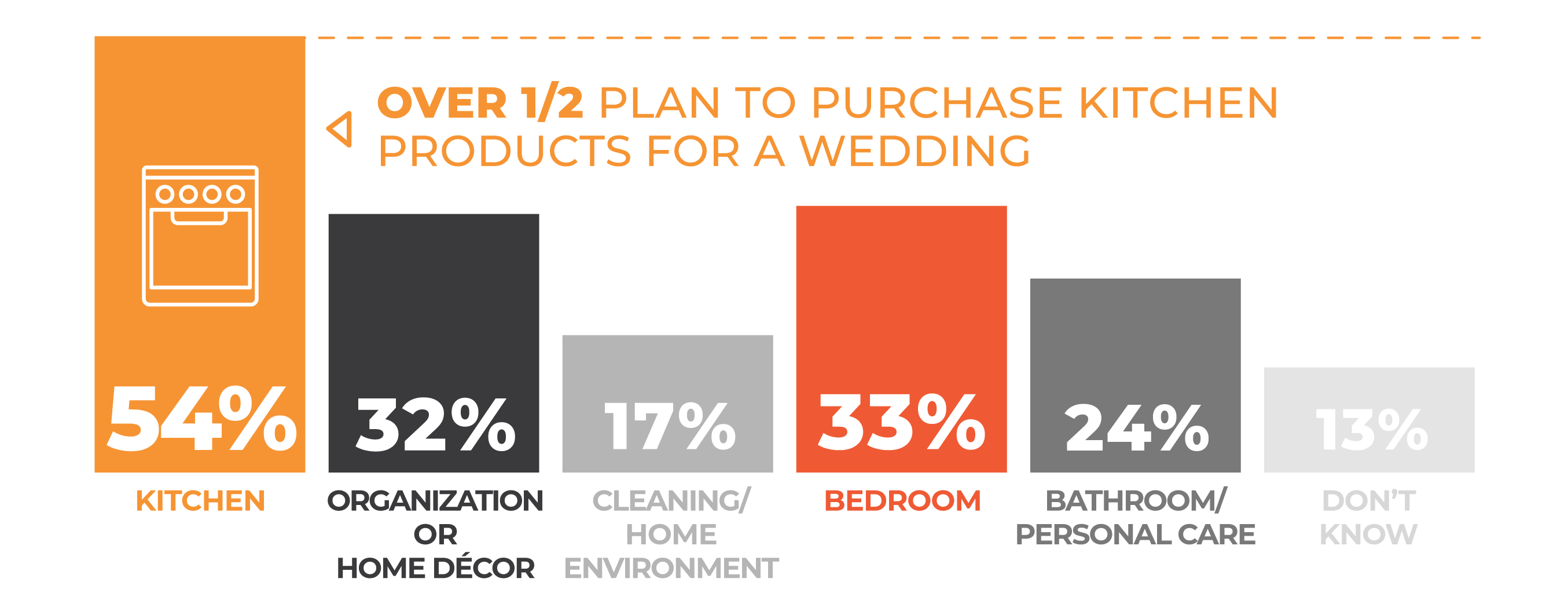
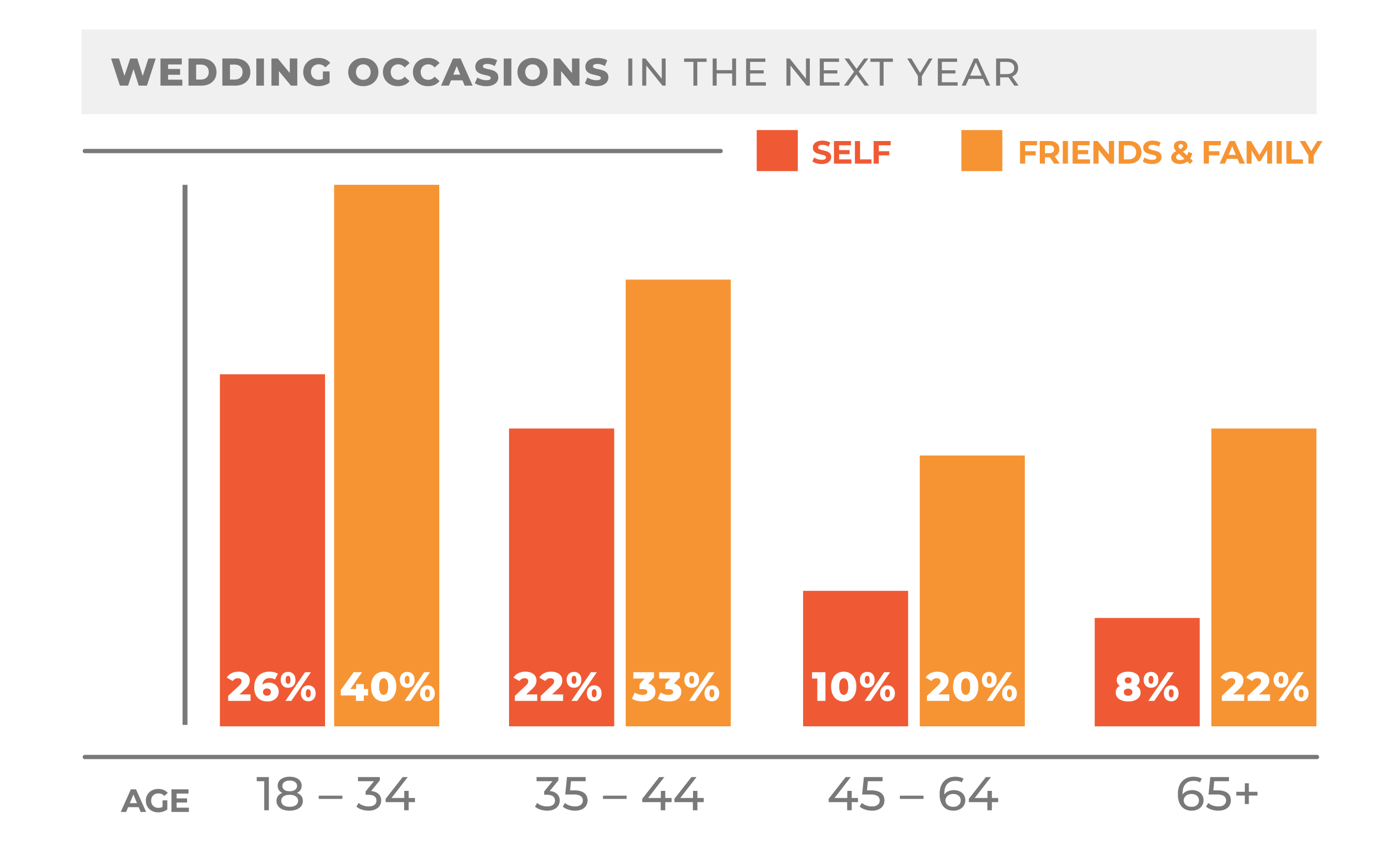
Home Ownership
It’s no question consumers are on the move. One quarter of respondents to the 2022 IHA Occasions Survey indicated a new home purchase/housewarming was in their future, while 32% responded they predicted the same for friends and/or family members.
These were both top responses, along with the likelihood of new pet ownership in the coming months. Craving more space for growing families and new pets and with a lack of long commutes for those now working virtually, the housing market has seen quite a bit of activity in the last year.
“In addition to buying new homes because of the desire to own a home and to be close to friends and family, 12% of 2021 home buyers purchased a multi-generational home save money and to take care of aging parents and children 18 or older who are remaining or returning home.”
– 2021 Home Buyers and Sellers Generational Trend Report by the National Association of Realtors
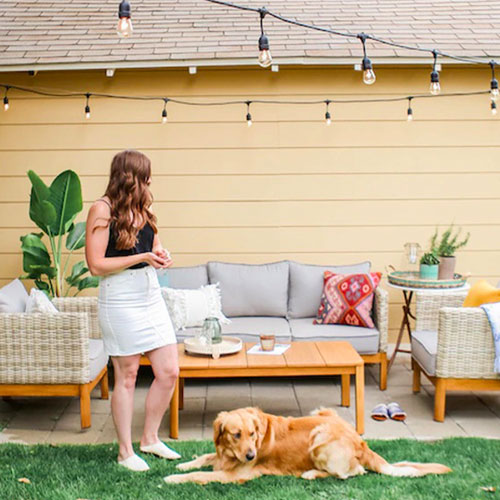
One quarter of respondents indicated a new home purchase/housewarming was in their future, while 32% responded they predicted the same for friends and/or family members.
According to the 2021 Home Buyers and Sellers Generational Trend Report by the National Association of Realtors, the most common reason for recently purchasing a home under 66 years of age was the desire to own a home of their own, while respondents 66 years and older wanted to downsize and be closer to family and friends. In addition, 12% of 2021 home buyers purchased a multi-generational home to save money, as well as to take care of aging parents and children 18 or older who are remaining or returning home.
With that, 2022 is ripe for consumers to shop for housewarming gifts — and purchase for themselves as well. This form of self-gifting is something industry insiders expect to be a growing trend well into the next year and beyond as consumers continue to put a focus on their health and wellness, both physically and mentally.
Examples of this could include a consumer upgrading to a new espresso machine after years of using an unreliable coffeemaker or tiring of their old China pattern and deciding instead to purchase a new dinnerware set that is more reflective of their current tastes. And, if they’re not purchasing this for themselves, they are happy to add such higher-ticket items to a housewarming wish list with gift purchasers more inclined than ever to give gifts that are desired.
And while 34% (1/3) of Survey respondents stated they were most likely to purchase a home and housewares gift for a housewarming event, industry marketers still face the majority of consumers leaning towards a non-housewares good such as gift cards (12%), plants (15%) and wine (10%) versus dishes (5%) and toaster (5%). To capture the attention of recipients and gift purchasers, positioning housewares that can both elevate one’s lifestyle and also make household routines easier is key to reaching the consumer at the point of purchase.
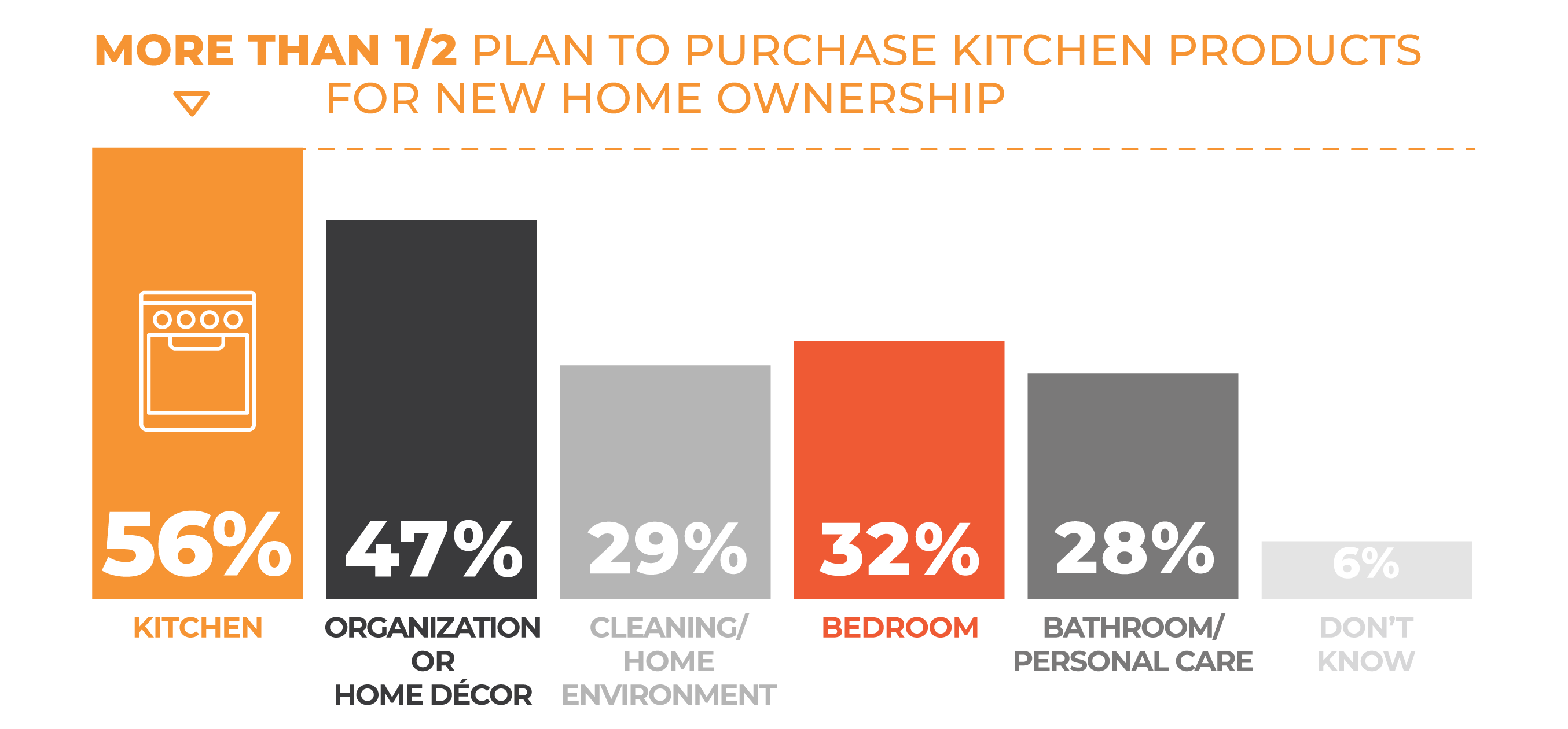
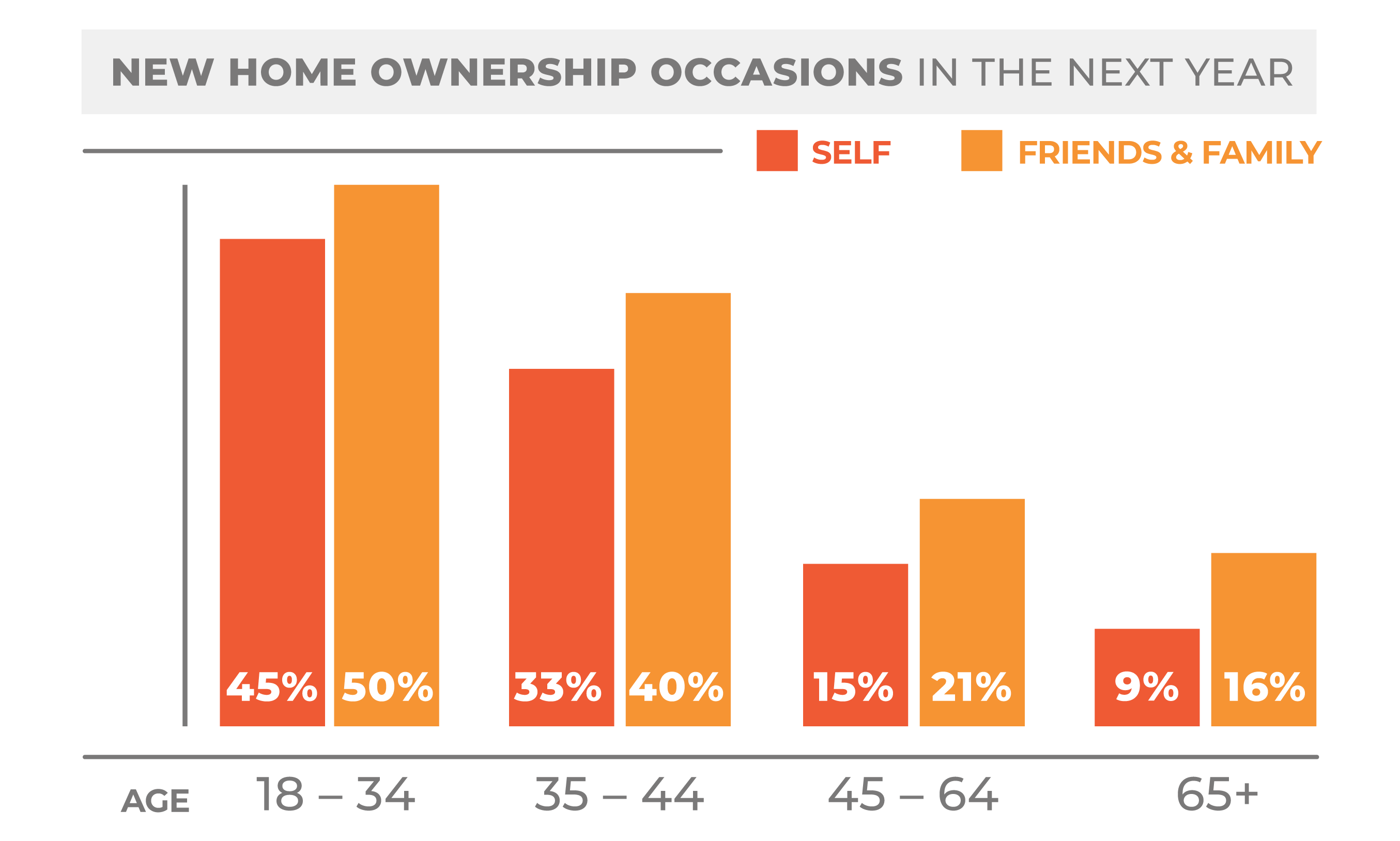
Pet Ownership
Whether they are first-time pet owners or seasoned pet veterans adding to the brood, consumer fondness for dogs, cats and other household pets has taken on a new meaning in the last decade or so, buoyed by the companionship and comfort pets have brought during the pandemic.
According to the 2021-2022 National Pet Owners Survey by the American Pet Products Association (APPA), pet ownership in the U.S. rose from 67% of households to an all-time high of 70%. Regarding this increase, the APPA said that pets played a central role in comforting consumers during the COVID-19 pandemic and industry insiders predict this trend will continue.
Even before the pandemic, pet ownership was on the rise, as was the consumer interest in elevated goods for pets, from decorated bowls and biscuit baking pans to products that celebrate fondness for pets, such as personalized mugs, totes and décor.
“For the consumer, it’s not just about buying pet accessories, but also ancillary products, such as air purifiers, vacuums and portable heaters, that solve some of the issues that may come up when new pets enter the home, such as allergies and shedding pet hair”
– Leana Salamah, VP, marketing, IHA

As pets have become such an important part of consumer lifestyles, new pet ownership has become a life event celebrated on a greater level.
More than a quarter (27%) of 2022 IHA Occasions Survey respondents chose new pet ownership as the life event most likely to happen for themselves in the next 12 months. This points to the importance consumers have placed on pets and where the industry should be looking to provide smart gifting solutions to fit those needs.
“Pet ownership has skyrocketed,” said Joe Derochowski, home industry advisor for The NPD Group. “I think that has been one of the biggest drivers of the industry for this period.”
When it comes to what types of goods consumers are gifting, the home environment category is among of the most popular for this event. More than half of Survey respondents (51%) stated that cleaning and home environment products were the most likely purchases for a new pet acquisition.
“This shows that for the consumer, it’s not just about buying pet accessories, but also ancillary products, such as air purifiers, vacuums and portable heaters, that solve some of the issues that may come up when new pets enter the home, such as allergies and shedding pet hair,” added Leana Salamah, vice president, marketing, International Housewares Association.
According to Derochowski, while manufacturers have started to make this connection between pet ownership and home environment products, such as including pet images on vacuum packaging and within messaging, it’s important to also speak to broader, emotional consumer trends such as keeping the home clean as we take more care with our health and wellness.
“Consumers are putting more of a focus on keeping calm at this time, and a clean home for ourselves, our families and our pets is one way to achieve this,” he said.
More than a quarter (27%) of the 2022 IHA Occasions Survey respondents chose new pet ownership as the life event most likely to happen for themselves in the next 12 months.
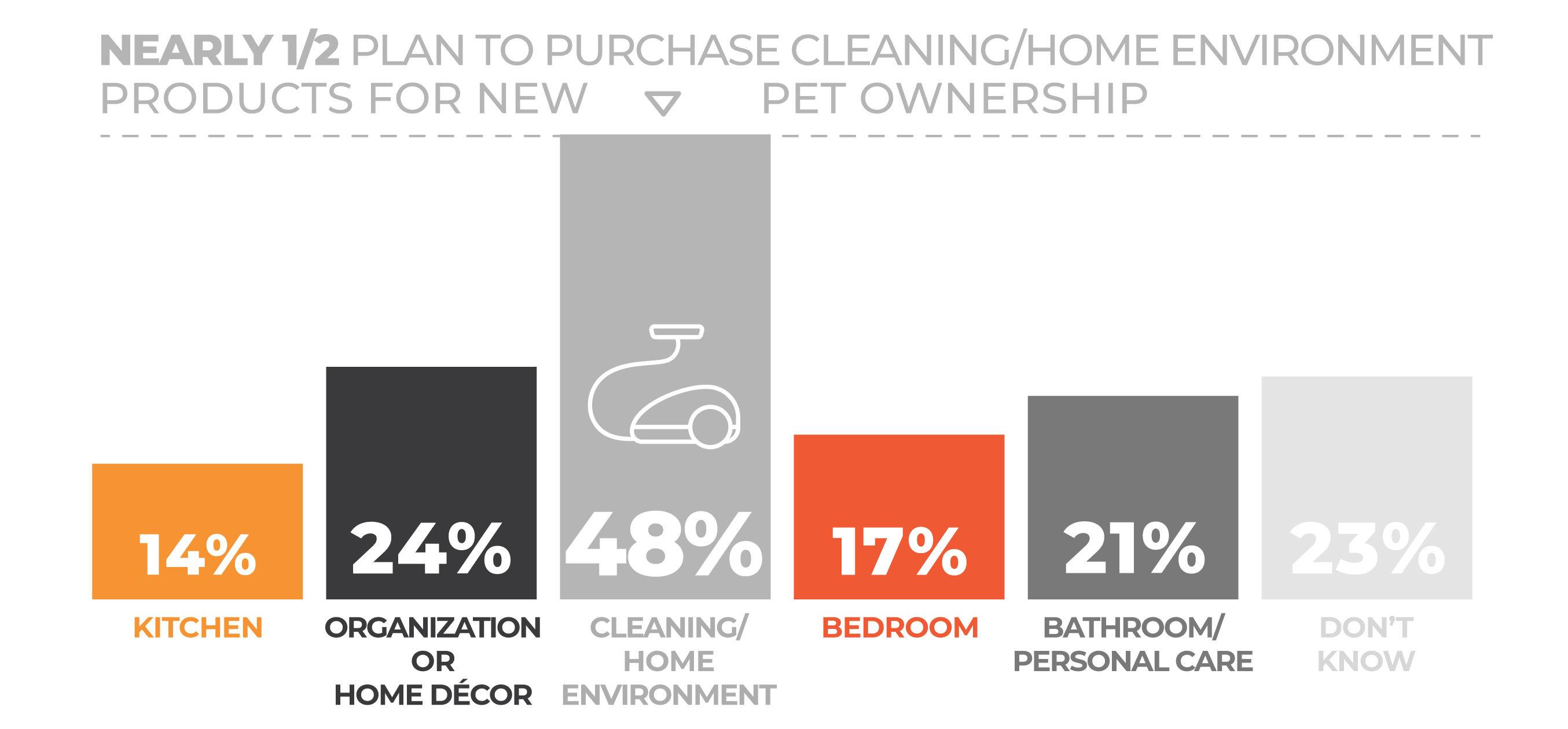
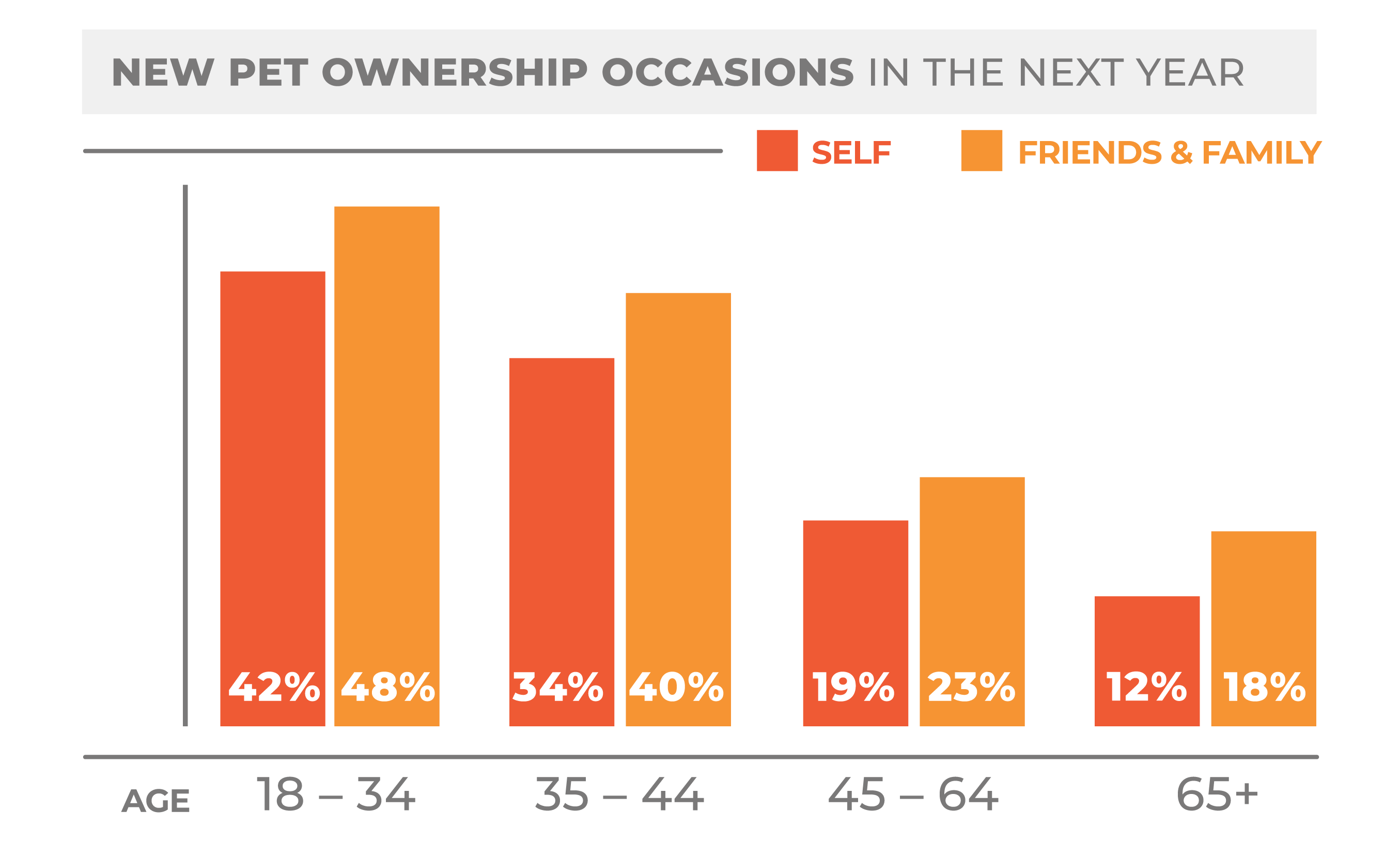
Retirement
As consumers are “aging younger” — living longer, healthier lives — retirement has evolved. The new retiree is more active, still plans to work in some capacity and is ready to pursue hobbies and interests more than ever before.
According to a 2021 Gallup survey, the average retirement age is 62 and the average age at which working respondents planned to retire was 64. This average retirement age was the highest Gallup has reported in its 20 years of tracking retirement trends. While the reasons are not clear, Gallup suggested that unexpected job loss, health challenges or job market conditions may all be factors.
While a high percentage (53%) of respondents to the 2022 IHA Occasions Survey reported that it was not at all likely that they would celebrate a friend or family member’s retirement in the next 12 months, those who do plan to purchase a retirement gift would look at a mix of home + housewares products. Some 32% stated they planned to buy a retiree a home organization or home décor products as their top selection, followed by cleaning or home environment products (26%) and bathroom or personal care products (23%) rounding out the most popular responses — all indicators of this shift for individuals to take care of themselves.
“The average retirement age is currently 62, but the average age at which working respondents planned to retire as of 2021 was 64. This average retirement age was the highest reported in its 20 years of tracking retirement trends.”
– 2021 Gallup survey
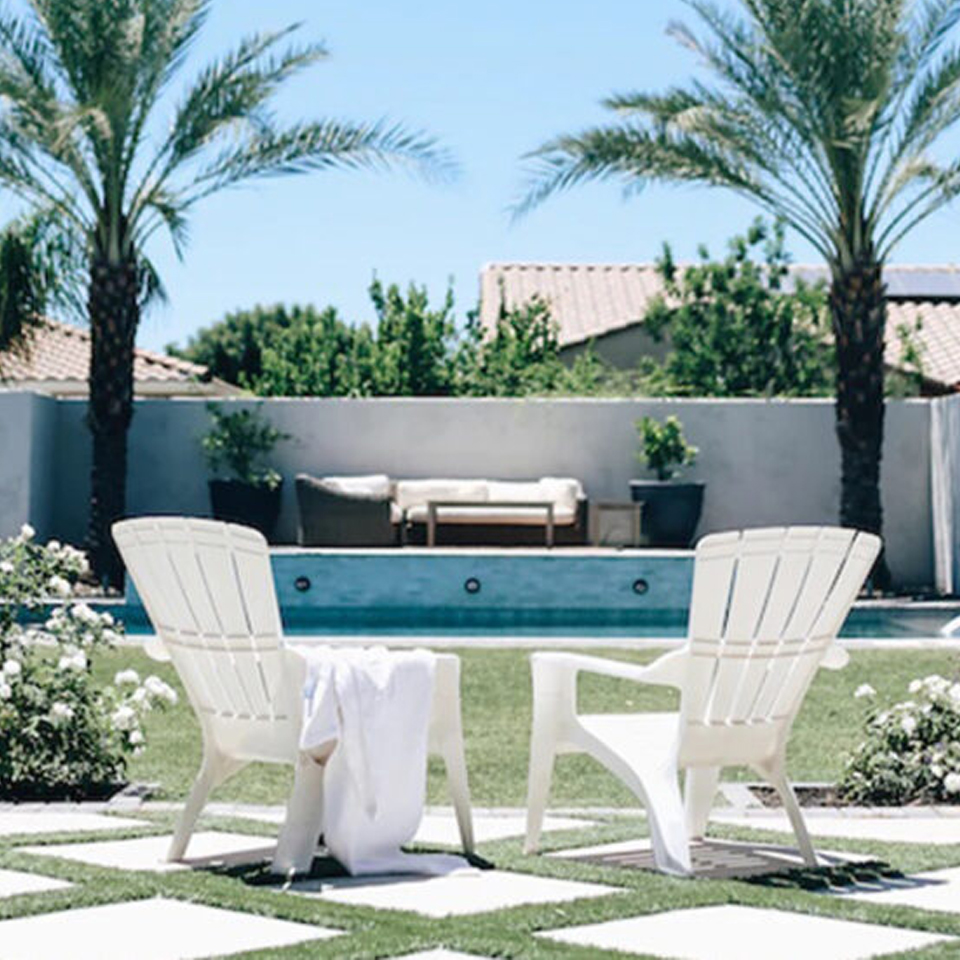
90% of respondents selected retirement as the life event that was most likely to take place for a friend or family member in 2022, ahead of a baby shower, leaving for college and new pet ownership.
However, of those Survey respondents who stated it is likely for a life event to take place among family and friends in the next year, 90% of respondents selected retirement, ahead of a baby shower, leaving for college and new pet ownership.
With the retirement age so young, at 62 on average, retirees have much life ahead to live and for the most part are more determined to enjoy their time with spouses, partners, family and friends. Industry insiders have stated this becomes a new opportunity for retailers to change how they market gifts for retirees, by celebrating the individual who is no longer defined by their work, but rather their passions, hobbies and pastimes.
Like wedding gifts, traditional corporate gifts for retirees are evolving to reflect personal aspirations — with a nod toward longevity and “aging in place”. There is a huge opportunity for retailers to send this lifestyle message to those purchasing for retirees, helping them think beyond traditional ideas such as a watch or wine, but instead to focus on the individual’s lifestyle and desires.
For example, if they will continue consulting, new desk accessories for new home offices may be welcome gifts or perhaps new cookware or juicers as they plan to do more cooking at home as they embark on their next stage of life — away from the office.
Like wedding gifts, traditional corporate gifts for retirees are evolving to reflect personal aspirations—with a nod toward longevity and “aging in place”.
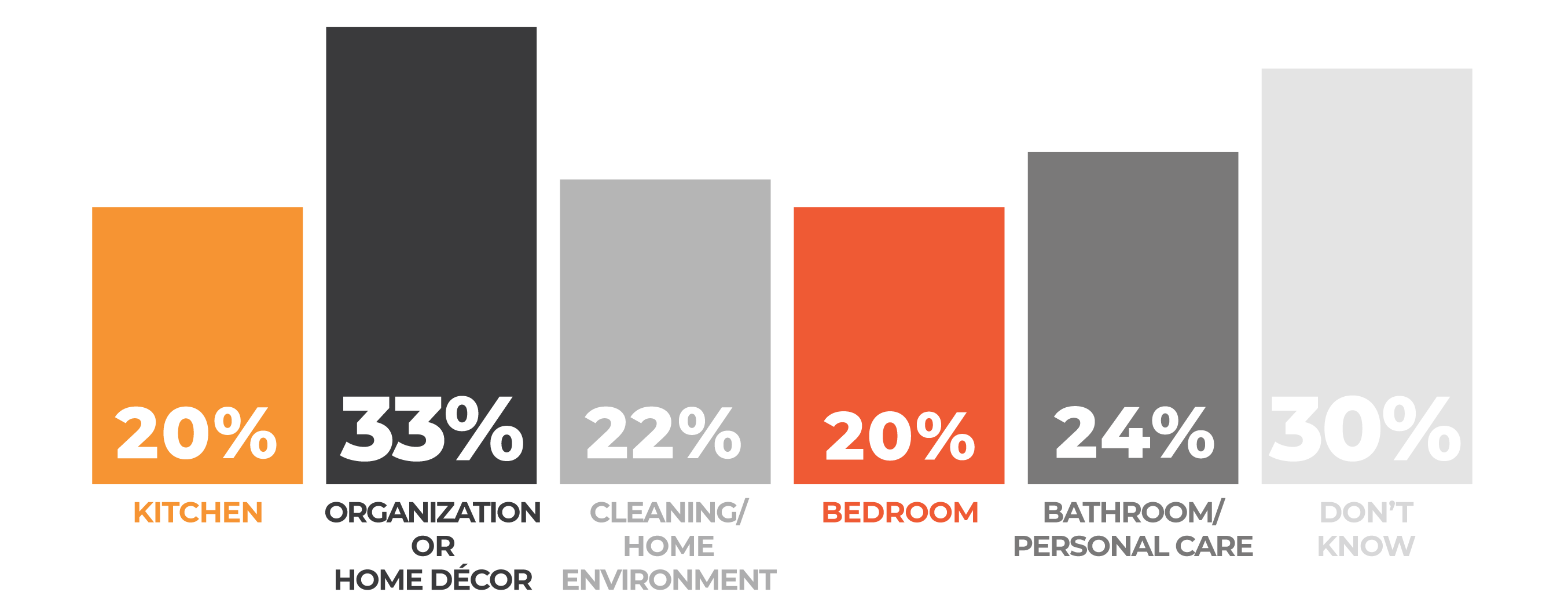
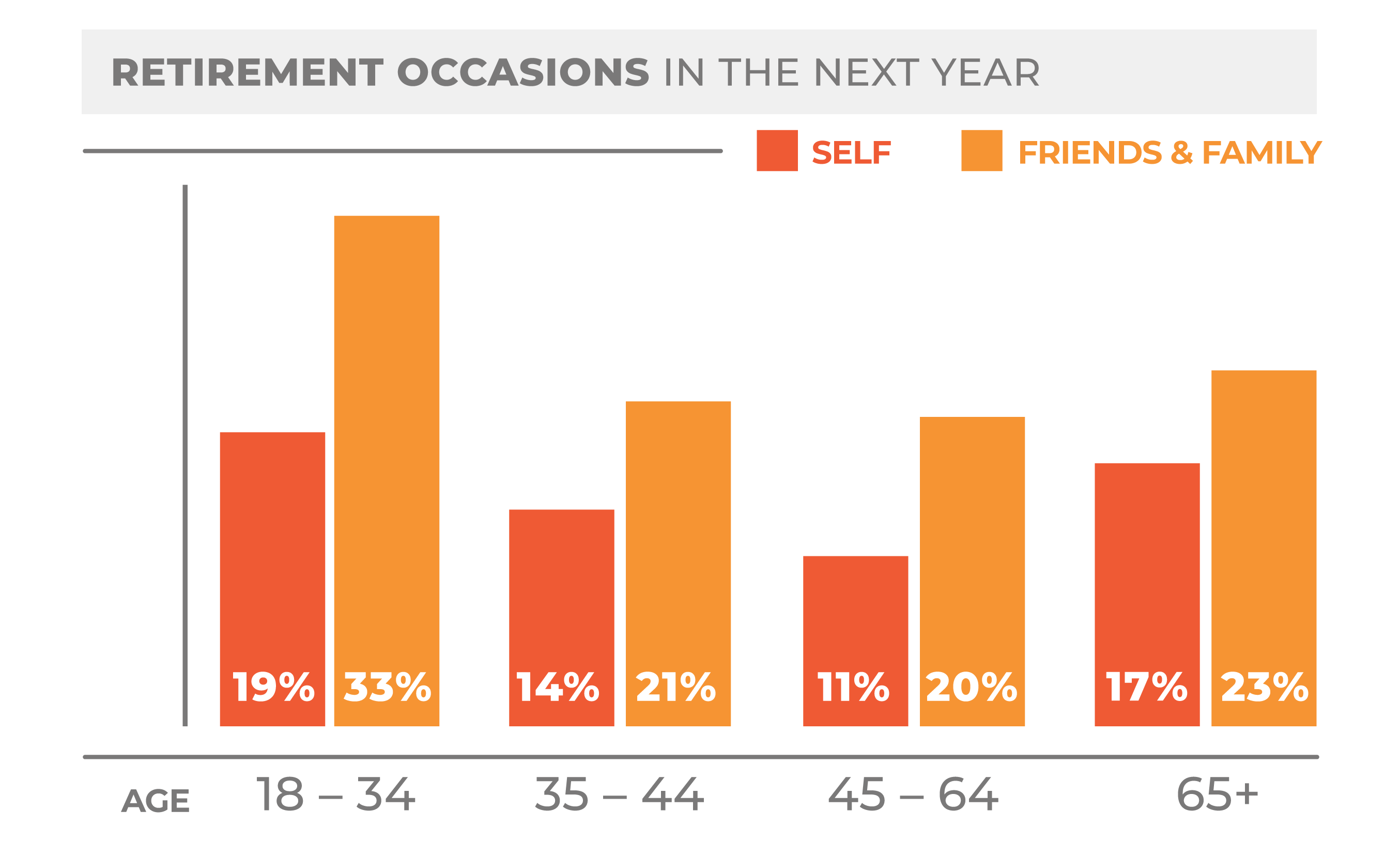

 Engagement
Engagement Bridal Showers
Bridal Showers Weddings
Weddings Home Ownership
Home Ownership Pet Ownership
Pet Ownership Baby Showers
Baby Showers College
College Retirement
Retirement